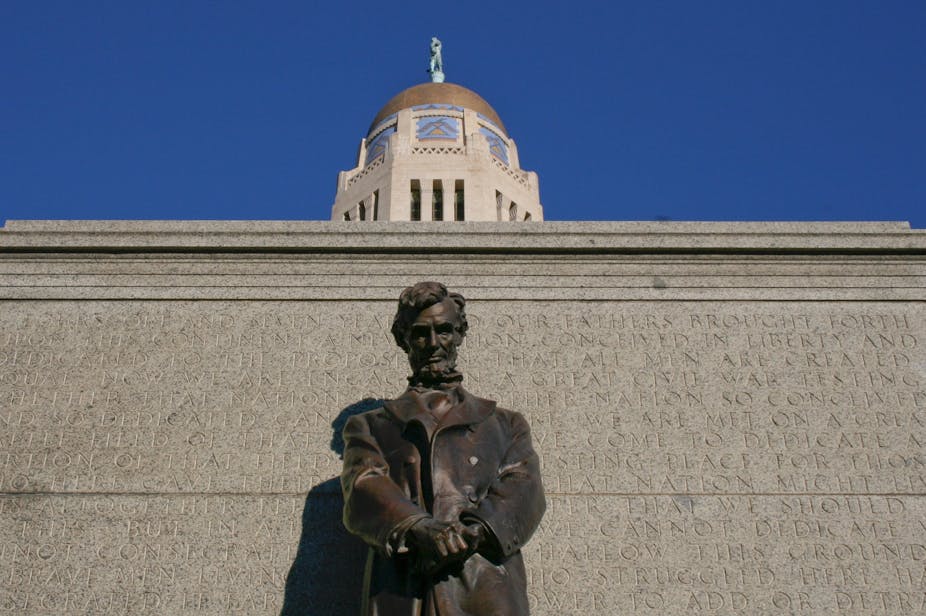The Nebraska legislature recently abolished the death penalty, overriding a veto by the state’s governor, Pete Ricketts. Nebraska has only executed three people since the Supreme Court upheld new death penalty laws in 1976 – the last execution was nearly two decades ago in 1997.
Partly because of that lack of use and with only ten people on death row, Republicans and Democrats in Nebraska’s legislature concluded the death penalty constituted wasteful and ineffective public policy. The conservative state thus joined 18 other states (and Washington DC) that do not sentence people to death. Six of those states have ended the practice since 2004.
But the Nebraska vote has not ended the death penalty debate. Even as the legislature was considering the repeal, Ricketts was purchasing drugs for lethal injections. Then, after the legislature overrode his veto, he announced he was “appalled” and would still proceed with executing those on the state’s death row.
A group called “Nebraskans for the Death Penalty”, headed by three politicians connected to the governor, formed and began seeking a statewide voter referendum to bring back the death penalty.

Those who hoped to reverse the action of the legislature used language to scare voters. Ricketts referred to a murderer who was released from prison and then had sexually assaulted a young girl, warning: “There is no guarantee that convicted murderers will stay behind bars for life or not harm other innocent victims.” Meanwhile, one of the 19 Nebraska senators who had voted to keep the death penalty posted a photograph on his Facebook page of a woman’s mutilated corpse as an argument for capital punishment.
There was no logical connection between the crimes mentioned and the death penalty. The governor did not recognise that few murderers get executed – and the senator did not even know whether or not his Facebook photo was from a real crime. But it did not matter. Such arguments have been stirring our fears and causing politicians to make bad policy decisions about the death penalty for centuries.
Revenge killing
A normal first human reaction to a horrible crime is to desire vengeance on the perpetrator – and some of the pro-death penalty arguments in Nebraska sought to amplify that reflex. But, aside from the issue of whether human rights issues should be subject to popular vote, the question remains whether a state’s policy should be dictated by anger and fear – or whether representatives should be more measured as they weigh the pros and cons of criminal justice policy.
The Nebraska legislature took the latter approach by focusing on concerns such as the cost of maintaining an expensive and rarely used punishment that creates a risk of executing an innocent person. But much of the reaction to the vote has been driven by politics of fear.
Hope for progress
The past decade is not the first time spell that has seen US states abandoned the death penalty – states abolished capital punishment during other periods too, including 1846-1953, 1907-1917 and 1957-1965.
There are several reasons why states and countries abolish the death penalty. Often they are guided by progressive leaders. In the early 1980s in France, François Mitterrand ran for president as an opponent of capital punishment and then oversaw the abolition of the death penalty.
Leaders in other countries and at the United Nations have also played important roles in educating the public about capital punishment. Similarly, several US governors led their states in getting rid of the death penalty.
As in Nebraska, sometimes there is a backlash to abolition. In some cases, states have brought back capital punishment, often driven by fears stoked by politicians relating to a specific crime or by fears of certain groups of people. Often, politicians believe that stirring up fears can help them get elected – one famous example occurred in 1988 when the then vice-president, George H W Bush, highlighted his presidential opponent’s opposition to the death penalty in a TV commercial featuring the mug shot of a black man convicted of murder.
Those trying to reinstate the death penalty will continue to focus on our fears. Such political posturing often digresses from genuine policy concerns. In my book Imprisoned by the Past, I reason that if the United States did not have a history with capital punishment, states would not design the death penalty we have.
This government system takes the lives of its citizens based on information that is imperfect and biased. Yet, several US states and a minority of countries still cling to a practice because of inertia and because some leaders believe they benefit from fear.
The trend in the past 50 years has consistently proceeded toward limiting executions around the world. Still, it is not surprising if there are setbacks – after all, history does not travel in a straight line. So we may not know if Nebraska will have the death penalty next year. But the state will eventually stop using capital punishment, because progress ultimately overrides the politics of fear.

